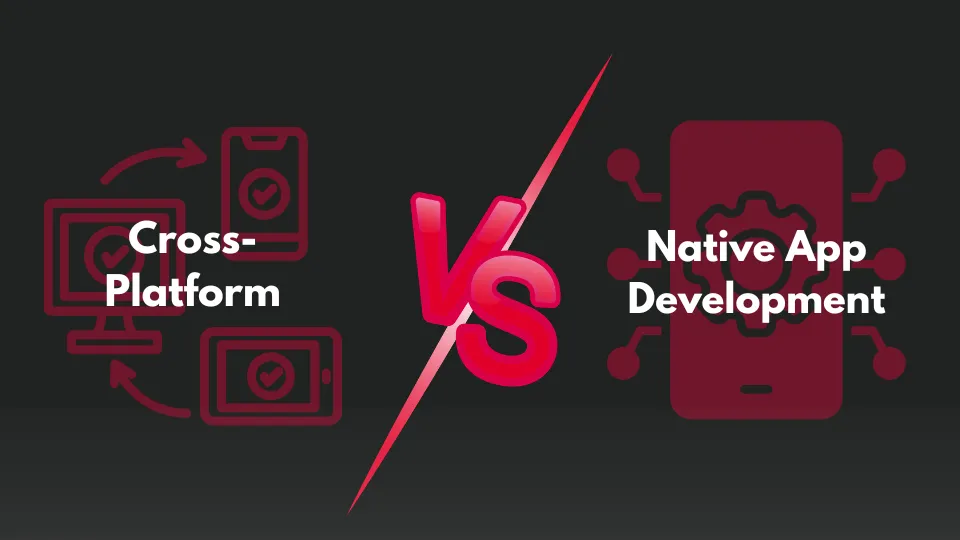Cross-platform app vs. Born-Native is one of the most important decisions that have to be made when starting with the process of mobile app development. All have their strengths and weaknesses, which will affect the flow, speed, price, and usability of your app. So it is always necessary to know the fundamental distinctions between them and weigh all the advantages and disadvantages to make the proper decision considering the requirements of the given project.
This Mobile App Development Comparison will help you decide What the Best Method of App Development Is for Your Objectives.
Are you ready to begin your second Mobile app? Here are the best app developers to help us create your perfectly designed customized app. Contact us now!
What is Native App Development?
Native app development means the development of an application that is created to run on a particular platform likely iOS or Android using programming languages applied to the particular platform. For instance, iOS apps are usually re-coded using Swift or Objective-C while Android apps are coded in either Java or Kotlin. Compared to web apps or applications, native apps have full access to all device services, which results in an enhanced and rich user experience.
Native App Advantages:
- High Performance: native apps are actually run on the devices’ native operating system and are characterized by their fast and animated performances.
- Full Access to Device Features: Native development also enables developers to get the best of the features such as; camera, GPS, and push notifications among others.
- Enhanced User Experience: These apps are developed following platform standards and hence customer experiences are usual and immersive.
- Greater Security: As with specific security options and APIs, native apps provide very high levels of data protection.
Cross-Platform App Development
Cross-platform app Development refers to the process of creating a single app that can function on multiple platforms and usually, builders use React Native, Flutter, and Xamarin. It extends the targeting of consumers to the iOS and Android platforms while also holding down the cost of developing an application written on one platform to be delivered on the other.
Opportunities and Risks of Cross-Platform App:
Pros:
- Cost-Effective: Because the codebase is interoperable across platforms, the expense of the development is lowered.
- Faster Development: A single code makes it easier to release and fundamental adjustments can be made for all the versions at once.
- Consistent Design: In mobile technology, the cross-platform app allows the same appearance on different devices, the continuity of the brand.
- Broader Audience Reach: Using only one set of code puts your app on both iOS and Android, thus increasing your user base.
Cons:
- Limited Access to Native Features: Depending on the type of port and the device itself some features or even some of the more advanced functionality may prove slow or may not be fully functional at all.
- Performance Constraints: Applications that work on multiple platforms are generally less effective compared to single native environment applications because multiple layers of programming exist.
- Design Limitations: Some of the native elements may be limited which gives a genuine appeal on each of the platforms.
Native vs Cross-Platform Apps: Key Factors to Consider
It is crucial to take a closer look at the Native vs Cross-Platform Apps in the below points: To provide you with a clear understanding of which approach is best suited for you, here is a side-by-side comparison of both approaches evaluated on important factors.
1. Performance
- Native: Comes with high performance through direct access to the platform resources, and is most suitable for high-performance applications, such as games or highly complex apps.
- Cross-Platform: Though often quite fast to develop, cross-platform apps may suffer from slight lag related to added abstraction, and are not well suited for applications that demand substantial load.
2. User Experience
- Native: Focusing on the UI/UX, native apps provide their users with a more comfortable and convenient interactive experience close to their platform preferences.
- Cross-Platform: While tools like Flutter attempt to reproduce native UI elements it is possible that the aesthetic is not as integrated between platforms.
3. Cost and Time Efficiency
- Native: This has to be done individually for each platform which in some way increases both the time of the development and the costs involved.
- Cross-Platform: Enables faster development with a single codebase, Low cost of implementation due to less resource utilization for product development hence suitable for businesses with more limited budgets.
4. Access to Device Features
- Native: All system bells and whistles are accessible and used to the optimum level of platform capabilities.
- Cross-Platform: Features are based on the framework used, and some features can be limited or even affect other features.
When to Choose Native App Development
Choose the native methods if your application is heavy, complex in its features or requires an excellent user interface. Here are specific scenarios where Native App Advantages are especially beneficial:
- Performance-Intensive Applications: This is because applications that require some type of performance such as gaming or AR/VR apps, are best developed natively.
- Heavy Device Integration: If your app requires any of the high-end features of the device for instance GPS, Bluetooth, or real-time notification the native development affords the best opportunity.
- Long-Term User Retention: The use of native apps provides greater improved stability and optimization helpful in the app user engagement, hence higher the possibility of users retaining the particular application.
When to Choose Cross-Platform App Development
Cross-platform app Development is done when a startup company or a business requires to develop for multiple platforms and does not have an amount of money to invest. Scenarios that support a cross-platform approach include:
- Cost-Effective Solutions: Cost reduction associated with sharing a common code, is particularly valuable to organizations with a small budget.
- Time-Sensitive Projects: It becomes even more suitable for projects that require shorter time to complete through cross-platform development.
- Basic to Moderate Functionality: Computer applications that do not need many platform-specific requisites function optimally with a cross-platform architecture.
Cross-Platform vs Native App Development: Making the Best Choice
Cross-platform vs Native App Development is more of a compromise of one aspect over the other depending on your preferences. Here’s a Mobile App Development Comparison to help make the choice:
- Budget and Timeline: Cross-platform, is, therefore, definitely the Best Approach for App Development especially if you are low on budget or time.
- User Experience and Performance: Local applications should be used if the emphasis is made on the critical interaction with consumers and maximization of performance.
- Future Scalability: Think about your future vision for the app; if you’re going to add many features to the app, then it’s wiser to go with the native approach.
See Also: Wonderful Tips to Design an Excellent Landing Page
Looking for ways to advance your Mobile application development? We have expert app developers who will ensure that your app suits your needs as you need it. Get started with us now!
Conclusion
The choice between the Native vs Cross-Platform apps depends of the project specifications, available resources, and the target audience. Native App Advantages area unit in performance, user experience, and the access to device options that make it the right choice for complicated or high performance. On the other hand, Cross-Platform App Pros and Cons discuss the advantages and disadvantages of Cross-Platform Apps in terms of cost and time, convincing businesses eager to create multiple-platform applications.
Reading through this Mobile App Development Comparison, we should be able to estimate your requirements to get to the Best Approach for App Development. Regardless of which path you go with remember it’s all about building an app that offers utility, meets people’s expectations, and ultimately accomplishes your business objectives.
Please feel free to contact WebOConnect for any kind of professional help!
FAQs:
Q1: What is the main difference between native and cross-platform app development?
A1: Native applications are created for a certain operating system, they work faster as contrasted with cross-platform applications which are created from a single set of code for both systems.
Q2: Which approach is more cost-effective for app development?
A2: On average cross-platform is more cost efficient especially if the code will be used for iOS and Android.
Q3: When should I choose native app development over cross-platform?
A3: Select native when you are targeting top-notch application performance, heavy multi-faceted application, or when you require utilization of all the features supported by the device.
Q4: Can cross-platform apps provide a similar user experience to native apps?
A4: Frameworks like Flutter and React Native are very close, however, the result of native platform apps is much better in terms of platform-specific performances.
Q5: Are cross-platform applications good for heavy-duty or high bandwidth applications?
A5: Cross platform is good for apps of medium complexity but if you are going to deal with intensive applications like games then native way is best.


_thumb.webp)
_thumb.webp)















